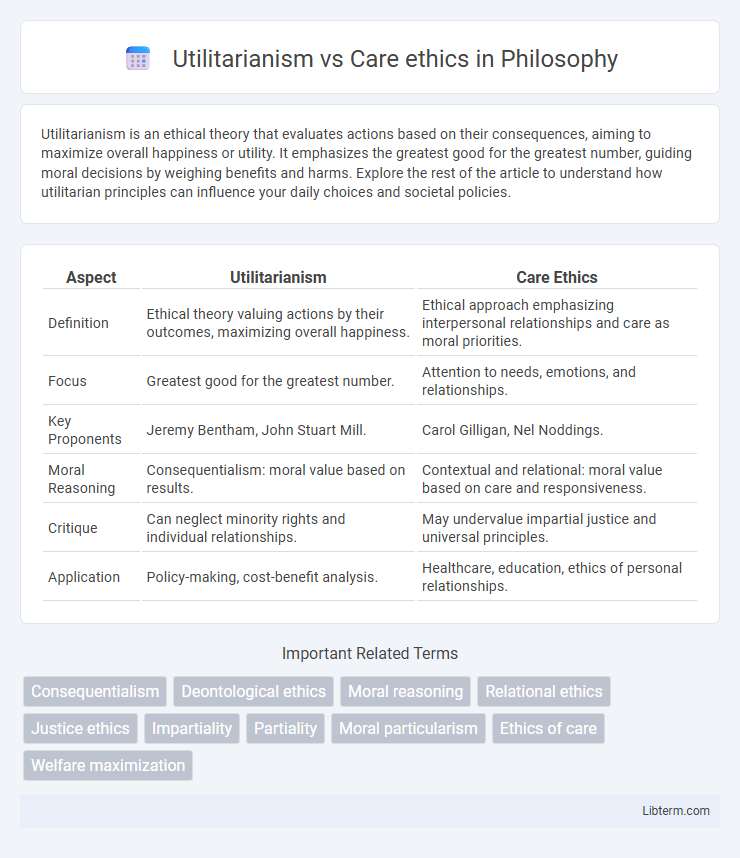Utilitarianism is an ethical theory that evaluates actions based on their consequences, aiming to maximize overall happiness or utility. It emphasizes the greatest good for the greatest number, guiding moral decisions by weighing benefits and harms. Explore the rest of the article to understand how utilitarian principles can influence your daily choices and societal policies.
Table of Comparison
| Aspect | Utilitarianism | Care Ethics |
|---|---|---|
| Definition | Ethical theory valuing actions by their outcomes, maximizing overall happiness. | Ethical approach emphasizing interpersonal relationships and care as moral priorities. |
| Focus | Greatest good for the greatest number. | Attention to needs, emotions, and relationships. |
| Key Proponents | Jeremy Bentham, John Stuart Mill. | Carol Gilligan, Nel Noddings. |
| Moral Reasoning | Consequentialism: moral value based on results. | Contextual and relational: moral value based on care and responsiveness. |
| Critique | Can neglect minority rights and individual relationships. | May undervalue impartial justice and universal principles. |
| Application | Policy-making, cost-benefit analysis. | Healthcare, education, ethics of personal relationships. |
Introduction to Utilitarianism and Care Ethics
Utilitarianism is an ethical theory that evaluates actions based on their consequences, aiming to maximize overall happiness or utility for the greatest number of people. Care ethics emphasizes the importance of interpersonal relationships, empathy, and emotional responsiveness, prioritizing care and responsibility over abstract principles. Both frameworks offer distinct approaches: utilitarianism focuses on quantifiable outcomes, while care ethics centers on contextual moral understanding rooted in human connections.
Historical Backgrounds of Utilitarianism and Care Ethics
Utilitarianism originated in the 18th and 19th centuries, primarily shaped by philosophers Jeremy Bentham and John Stuart Mill, emphasizing the maximization of overall happiness as the foundation of ethical decision-making. Care ethics emerged in the late 20th century through the work of Carol Gilligan and Nel Noddings, as a response to traditional moral theories, highlighting the importance of interpersonal relationships and empathy. These distinct historical backgrounds reflect utilitarianism's roots in Enlightenment thought contrasted with care ethics' foundation in feminist philosophy and social context.
Core Principles of Utilitarianism
Utilitarianism centers on maximizing overall happiness and minimizing suffering, guided by the principle of the greatest good for the greatest number. It employs consequentialist reasoning, assessing actions solely by their outcomes and promoting impartiality in moral decisions. Core concepts include utility, quantifying pleasure and pain, and the impartial consideration of all affected individuals' interests.
Foundational Concepts of Care Ethics
Care ethics emphasizes relational interdependence, emotional engagement, and contextual decision-making as foundational concepts, contrasting with utilitarianism's focus on maximizing overall happiness through impartial calculations. It prioritizes empathy, responsiveness to individual needs, and the moral significance of nurturing relationships over abstract principles or utility maximization. This ethical framework critiques utilitarianism's tendency to overlook personal connections and the complexities involved in caregiving situations.
Moral Reasoning: Utility Versus Relational Care
Utilitarianism bases moral reasoning on maximizing overall happiness or utility, evaluating actions by their outcomes and the greatest good for the greatest number. Care ethics, in contrast, emphasizes relational care, prioritizing empathy, attentiveness, and nurturing relationships as the foundation of ethical decisions. This approach challenges the abstract calculation of utility by centering moral responsibility within interpersonal connections and the context of specific social environments.
Approaches to Ethical Dilemmas: A Comparative Analysis
Utilitarianism addresses ethical dilemmas by prioritizing the greatest good for the greatest number, using a cost-benefit analysis to quantify outcomes and maximize overall happiness. Care ethics emphasizes relational contexts and emotional engagement, focusing on empathy, compassion, and the moral significance of interpersonal connections to guide decision-making. This comparative analysis reveals utilitarianism's focus on impartial consequences contrasts with care ethics' stress on caring responsibilities and the nuanced dynamics of individual relationships.
Critiques and Limitations of Utilitarianism
Utilitarianism faces critiques for its reliance on quantifying happiness, often overlooking individual rights and justice in pursuit of the greatest good for the greatest number. Critics argue that this approach can justify morally questionable actions by sacrificing minority interests and failing to account for emotional and relational complexities. Care ethics emphasizes empathy and interpersonal relationships, highlighting utilitarianism's limitations in addressing moral responsibilities rooted in care and human connection.
Criticisms and Challenges in Care Ethics
Care ethics faces criticism for its perceived subjectivity and lack of universal principles, which some argue weakens its application in broader ethical dilemmas compared to utilitarianism's focus on maximizing overall happiness. The challenge of balancing emotional involvement with impartial moral judgment often complicates decision-making within care ethics. Critics also highlight difficulties in addressing justice and rights issues, where care ethics may prioritize personal relationships over fairness and consistency in ethical rules.
Practical Applications in Modern Contexts
Utilitarianism guides decision-making in modern contexts by prioritizing actions that maximize overall happiness, often applied in public policy, resource allocation, and ethical AI development. Care ethics emphasizes relational interdependence and contextual sensitivity, influencing fields such as healthcare, education, and social work by fostering empathy and personalized support. Together, these frameworks address practical challenges by balancing collective welfare with individual needs in contemporary societal structures.
Conclusion: Integrating Utilitarianism and Care Ethics
Integrating Utilitarianism and Care Ethics enhances ethical decision-making by balancing the pursuit of the greatest good with attentiveness to relationships and individual needs. This synthesis fosters more nuanced moral judgments that address both universal consequences and contextual empathy. Embracing both frameworks leads to comprehensive ethics promoting fairness, compassion, and practical outcomes in diverse situations.
Utilitarianism Infographic

 libterm.com
libterm.com